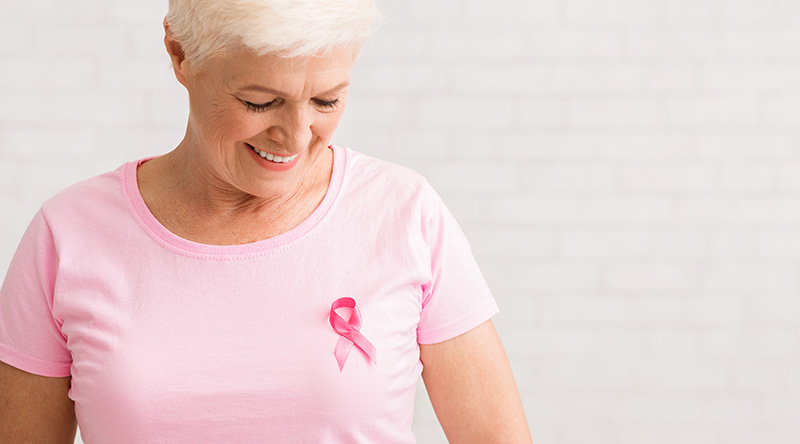
By Cristina S. Alencar, MD, Virginia Oncology Associates
Part 1 of the Series: How to be proactive with your health
Women who know their breasts are more likely to catch changes that could indicate cancer.
Every breast is unique, including its textures and density. Genetic factors and lifestyle choices can directly affect breast health. A clinical breast exam (CBE) done by your healthcare professional at least once a year, and monthly breast self-exams can uncover problems or detect breast cancer at an early, treatable stage.
Before you start doing a breast self-exam, it is a good idea to ask your healthcare provider to demonstrate the process. Breasts naturally have a “lumpy” texture, and normal hormonal fluctuations affect their tissues and glands. Therefore, you should examine your breasts at the same time each month, ideally a few days after menstruation ends (usually the week after your period finishes), and for women who do not menstruate anymore, choose the same time of each month when your breasts are not tender.
Self-exams can be done in the shower, in front of a mirror, or lying down. One effective method is to work in circular motions from the outside of the breast in, using the pads of your fingers rather than fingertips for better coverage, and finishing with the tissue in your armpit.
The most common signs or symptoms of breast cancer are lumps or nodes felt on or inside of the breast, skin changes such as swelling, redness, or other visible differences in one or both breasts, increase in size or change in the shape of the breast(s), change in appearance of one or both nipples, nipple discharge other than breast milk, nipple inversion or turning inward, and pain. Keep in mind, most breast cancers don’t hurt!
Anything that feels or looks different – especially if it’s different from your other breast – is worth an immediate checkup with your general practitioner or OB/GYN. Don’t panic. Trust your instincts and err on the side of caution.
According to the Johns Hopkins Breast Center, 40 percent of diagnosed breast cancers are detected by patients who find a lump. Yet because distinguishing between normal and abnormal tissue is tricky, self-exams alone are by no means enough.
Based on your individual cancer risk, you should schedule clinical breast exams once or twice annually and begin other recommended screenings at age 40 or younger. Mammograms, for example, can reveal masses up to two years before they’re palpable. If you have never received a mammogram, read our blog to learn what to expect at your first mammogram. The breast cancer specialists at Virginia Oncology Associates have created this video as a guide for breast cancer screening.
You can estimate your risk by learning your family history, particularly with known hereditary genetic mutations, and discussing that plus lifestyle factors (be honest!) with your physician. Additionally, there are different models that can help calculate breast cancer risk.
You can be proactive on a daily basis by maintaining a healthy weight, exercising regularly; not smoking; limiting alcohol to no more than one drink a day; breastfeeding children if possible; and treating only severe menopausal symptoms with the shortest and lowest possible doses of hormone therapy.
Unfortunately, most women – even health care professionals – don’t take all these protective measures. The more you understand and listen to your own body and breasts, the more comfortable and empowered you will feel.
Relationships with Professionals and Being Your Own Best Advocate
The first stop for breast care is either a primary care physician or OB/GYN, both well-versed in performing thorough annual clinical exams.
If there is a potential problem, those doctors will refer you for imaging tests and evaluation with a specialist. The best choice is a comprehensive breast center, which combines state-of-the-art technology and biopsy procedures, experienced oncologists, pathologists and surgeons, full-time radiologists, and a variety of treatments, as well as access to clinical trial information.
Such multispecialty centers often can offer different procedures on the same day. Patient navigators also can help you communicate with your medical team, understand therapies and terminology, set up appointments, and handle financial, legal or family challenges.
While you might be reluctant to ask for a second opinion, such requests are very common and even encouraged in oncology. That’s especially true before any surgical procedure or treatment with potentially significant side effects, such as chemotherapy or radiation.
Don’t ever be concerned about “offending” your physician; oncologists understand that a cancer diagnosis is a life-changer. They consider it healthy for patients to confirm findings and hear advice from another physician – even if it diverges from their own.
In fact, oncologists often will choose a particular specialist based on the cancer type and available treatments. Patients with rare diseases such as small cell cancer found on the breast, or lymphoma of the breast for example, likely need to go to a major medical center that handles such cases more frequently. An oncologist can also make a referral if you have a specialist in mind based on your research or an outside recommendation.
In most cases, temporarily delaying treatment to investigate all options is not a risk, although you should consult with your original oncologist. Careful consideration of your path forward is an important part of self-advocacy!
Unfortunately, most women – even health care professionals – don’t take all these protective measures. The more you understand and listen to your own body and breasts, the more comfortable and empowered you will feel.





